July 10, 1902.
A SPRING OF DIAMONDS.
————————
The Oft Changing Colors of the Chameleon Reproduced in the Sparkling Water.
————————
CRITTENDEN SPRINGS AND HOTEL.
————————
A lordly old style, four-storied, veranda bound, Southern hostelry.
A bounteous Kentucky hospitality, lavishly bestowed on the guests at that delightful Crittenden Springs hotel.
Great big waxed floors for the promenade, the musicale, the dance or social parties.
Forests of oak and maple and sycamores cover the great area of land comprising the estate.
Situated on a plateau overlooking a beautiful valley, with the grand views of the forest, the mountain and the mines.
A spring of health giving water, sparkling as with diamonds.
Melancholy gives way to laughter, crutches to dancing, plainness to beauty.
It is a life giving spring.
Special traveling rates are made from all stations on the Illinois Central Railroad to the welcoming, open doors of the hotel.
The hotel rates are more than moderate. The address is Mr. John Wilson, Marion, Kentucky.

————————
ORE AT DYCUSBURG.
————————
What an Old English Miner Thinks of the Prospect There.
————————
The following statement was made by Thos. Williams, an expert English miner, after closely investigating the ores on Messrs. Cassidy & Co's lands.
Dycusburg, Ky., May 13, 1901
This is to certify that I, Thomas Williams, was born in Derbyshire, England, Feb. 14, 1852, and entered the mining business in England at the age of fifteen and worked in the Cornwall mines, and Ashover lead, zinc and tin mines for 30 years. I have had considerable experience in the mining districts since I have been in the United States. I have just prospected some of the mineral lands of S. H. Cassidy & Co., and I find the mineral deposits as represented. The iron ore, as per specimens found, will make a yield of from 50 to 60 per cent of iron. The spar shows first class deposits; the zinc deposit is fine, with an extra amount of lead. I also find considerable amount of bone rock, and with the experience I have of mining I find these minerals will pay well.
"THS. WILILAMS."
Attest
"Joe Wanduful,"
"Arthur L. Dricks."
————————
A fine farming country on both sides of the Cumberland river in the immediate vicinity of Dycusburg has made a substantial, strong, enterprising town.
Now that the veins of fluor spar, lead and zinc are beginning to give forth their treasure the town has assumed more metropolitan ways.
With its wealth of tobacco, wheat and corn and minerals at hand Dycusburg lacks but little.
It has fortunes in its hydraulic limestone if it will but establish a cement plant.
With the cheapest transportation in the world--water--Dycusburg could supply the entire valleys of the Ohio, the Cumberland and the Tennessee rivers with its cement.
It sends millions of pounds of tobacco to Europe. It could supply millions of pounds of cement equal to the English "Portland."
The etching shows the three Cassidy tobacco warehouses, one being at Kuttawa, the flouring mill of F. B. Dycus & Co., besides a view of the two business streets of the town, also the commercial house of J. H. Clifton. Dycusburg, with such men as Clifton, Cassidy and Dycus will keep right in the front rank of Western Kentucky cities.
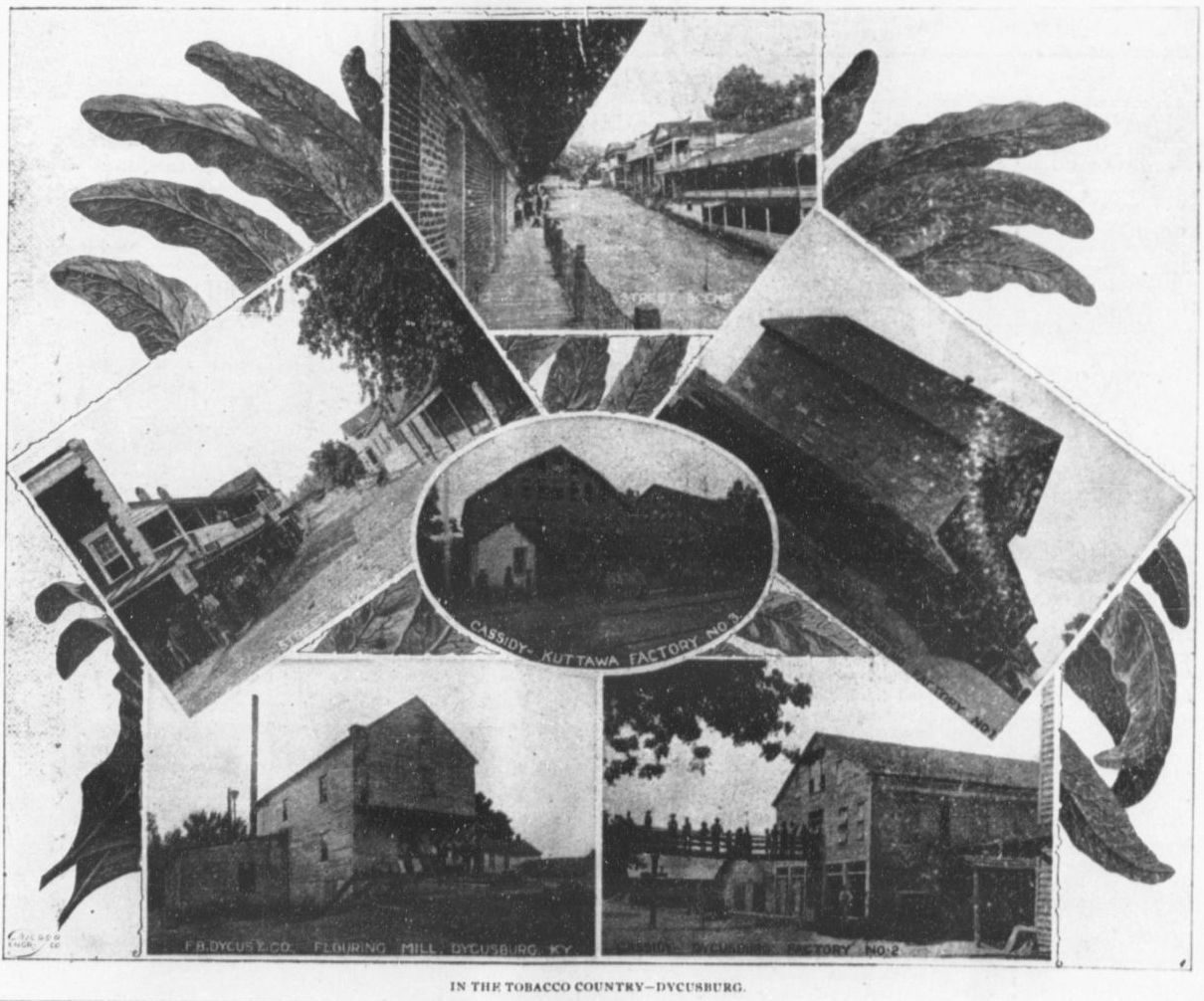
————————
S. H. CASSIDY.
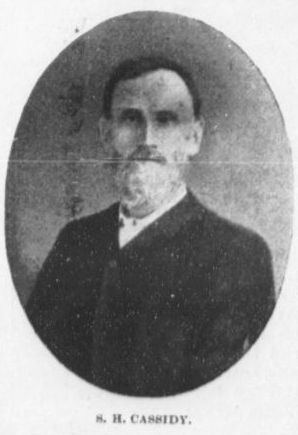
A Kentuckian by birth and a Kentuckian in every other way, hospitable, public spirited, having and deserving fully the respect and confidence of not only his immediate friends and neighbors, but the great business world as well. Mr. Cassidy is a typical example of what untiring energy, backed by good common sense, will accomplish.
The three great tobacco houses shown in the etching it will be noticed bear his name, he is also largely interested in the flouring mill of F. B. Dycus & Co. All in all Dycusburg owes much to Mr. Cassidy, and what is more to the point every inhabitant acknowledges it.
Mr. Cassidy is a Mason and also a member of the Cumberland Presbyterian church. His home life is all that such a man could have and what such a citizen deserves.
————————
J. H. CLIFTON.

One of the leading business houses of the splendid little town of Dycusburg on the Cumberland river bears the name of J. H. Clifton.
His career has been long, successful and honorable. The high esteem, the entire confidence of the people are his. A business integrity unapproachable. Fair dealing and an enterprising spirit has been the means of promoting the splendid patronage he now enjoys in his drug, hardware and grocery establishment. He is an important factor in the prosperity and advancement of the interests of Dycusburg, in all ways, religious, industrial and financial. Married on May 20, 1863, he has devoted thirty-five years of his life to active business, and full fifty years in making the lives of those around him happier.
————————
THE CRITTENDEN PRESS, with its special mining news every week, one year $1.00, in advance.
————————
MARION.
————————
The Gateway to the Western Kentucky Mineral Fields.
————————
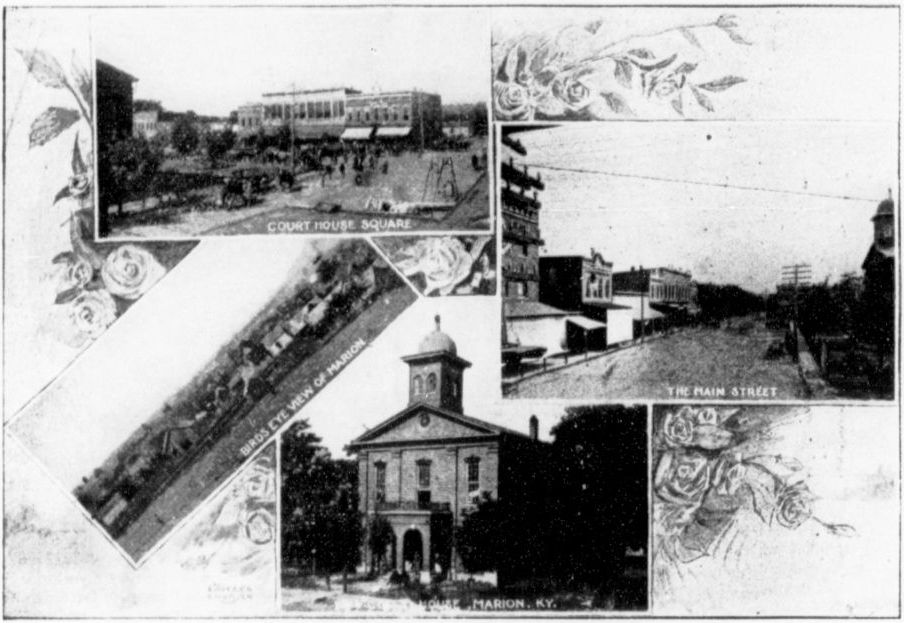
Situated on the Illinois Central Railroad, with numerous daily trains, four daily through mails and the distributing postoffice for a very large extent of the territory. Marion is the true gateway to the rich veins of zinc, lead and fluor spar in the Western Kentucky district.
A handsome city of 3,000 people with all the essentials of a prosperous, thriving town; broad, well kept streets, brilliantly illuminated by electricity, mercantile houses of a magnitude seldom seen in a city of its size, manufactories of various kinds and descriptions, great tobacco houses, flouring mills, fluor spar works and the various industries incident to a mining, mercantile, manufacturing and farming community.
A high school that is without a peer in the State of Kentucky, with teachers that rank with the best of the South.
Methodist, Presbyterian, Christian, Baptist, and Cumberland Presbyterian churches, housed in handsome brick and wood structures, of a seating capacity to meet the wants of large congregations.
Two first class State banks with capital, surplus and deposits abnormally large for Marion's population, yet showing a prosperous, progressive and enterprising citizenship.
A roller flouring mill of 200 barrels daily capacity, whose owners and managers are fully alive to the varied needs of the bread maker and the wheat grower.
Tobacco houses where the fragrant weed is housed, stripped and packed by the million pounds in great tierces for the English markets.
An opera house seating comfortably 900 people and in which the best talent in lectures and theatricals are given.
Masonic Lodges, the Chapter and Council, Knights of Pythias, Modern Woodmen are all well represented.
In fine, a city and a people well versed in all that makes a community happy and prosperous, withal a hearty Southern welcome awaits the newcomer, whoever he may be or wherever he may may [sic] come from.
————————
SALEM AND LOLA.
————————
One the Hub of the Mineral Field, the Other Noted for Carbonate.
————————
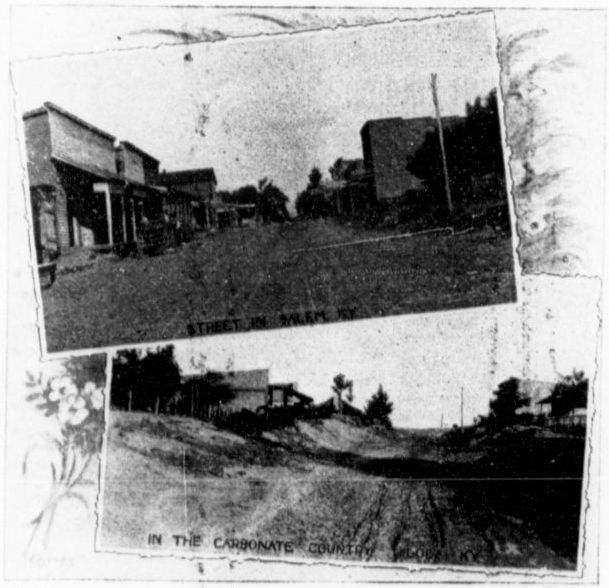
Salem, a handsome village of several hundred people, is surrounded by fertile farms and has many successful mining men among its residents. Its business houses are stocked with everything pertaining to good living, good dressing and all the mining tools requisite for the preliminary work on any one of its numerous veins. Overlooking a beautiful valley it has become the stopping place of most mining men who have interests in Livingston county.
The noted mining properties are the Cullen mine, owned by the Eagle Flour [Fluor] Spar Co., of Wheeling, W. Va., and the Morning Star mine, owned by the American Lead, Zinc & Fluor spar Co., of Cleveland, Ohio. Both of these properties are mentioned more fully in another page of this issue.
Lola, situated on the line of the two counties of Crittenden and Livingston is a thriving, wide awake, hustling place. The American Lead, Zinc & Fluor Spar Company's "Bonanza" mine is in the immediate vicinity of the town and is one of the best equipped properties in the entire district. Electric lights, air drills and all the essentials of a modern mining plant. Within a mile and a half of Lola are the carbonate mines, containing the same class of ore that is found in Crittenden county on the Blue & Nunn property.
Messrs. Foley & Williams, the general merchants of Lola, are always pleased to forward the interests of either investors or casual visitors, throughout the mining field.
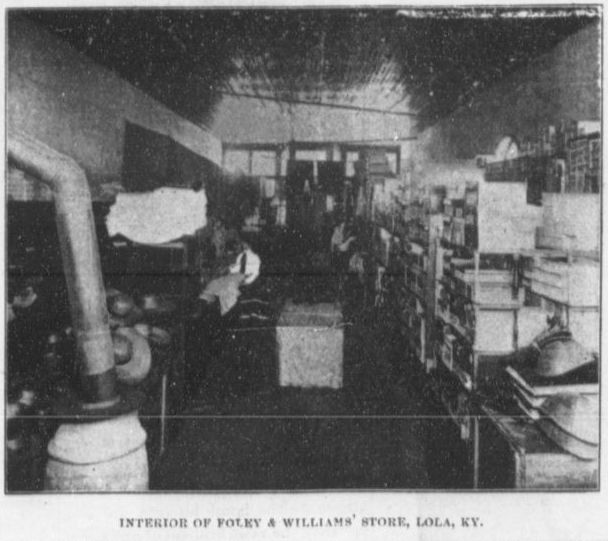
————————
Insurance.
The receipts for insurance policies at the agencies of Mr. George Crider and others engaged in the business for the past five months have been decidedly greater than for any previous twelve months in the past eight years. The percentage of increase is fully 120 per cent, or considerably more than double.
————————
About Prospecting.
Prospectors will find it a decided advantage to limit their holdings or leases or options. One piece of ground thoroughly prospected and a vein developed is worth a thousand acres of land simply described on paper in the shape of a lease.
————————
THE OPERA HOUSE.
Our house of amusement has been under the management of Mr. Walter Walker for the past two years. Last season was the best in the matter of high grade attractions, in the history of the opera house. Thirty entertainments consisting of some of the best theatrical organizations on the road; concert companies, and a lyceum course, the equal of which to Kentucky town three times the size of Marion, enjoyed, was presented. The lecture course was one of the costliest, and without doubt the best one that could have been secured. Gov. Bob Taylor, William J. Bryan, Henry Watterson, Gen. Jno. B. Gordon, and other men of equal talent, with two brilliant concert companies, formed the course. This group of attractions cost the manager of the house One Thousand Dollars.
The auditorium will seat nine hundred people. The house is lighted with electricity, an elegant new drop curtain adds to the attractiveness of the theatre. The people of Marion are amusement loving people, and first class attractions receive splendid support.
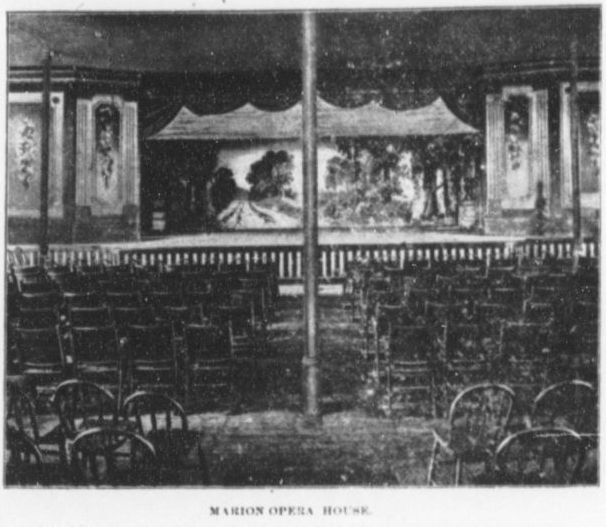
————————
THE POSTOFFICE.
————————
A Barometer of the Condition of the Country.
————————
As illustrating the growth and progress of the district the receipts for stamps at Uncle Sam's headquarters in Marion compared with previous years is a striking object lesson.
Mr. George Crider, the postmaster, reports:
Receipts in 1900 . . . . . . . . . . $2,645.00
Receipts in 1901 . . . . . . . . . . 3,029.00
Since the first of March Mr. Crider says the receipts have mad an average gain over the same date in 1902 of something over 25 per cent.
The Postoffice is open daily, except Sunday, 6 a. m. to 8 p. m. Two assistants are constantly employed.
————————

————————

————————
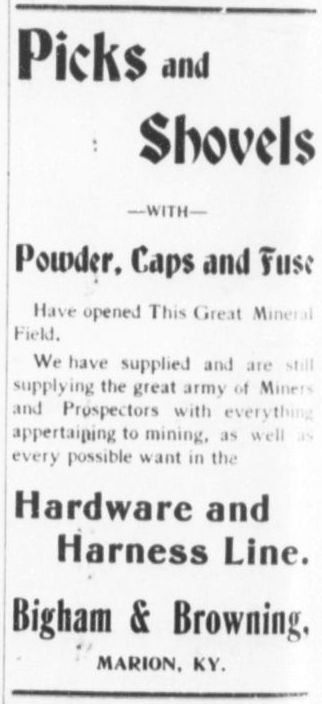
————————
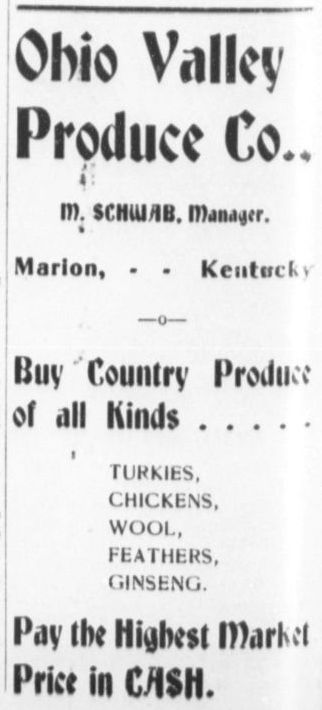
————————
Source: Crittenden Press. (Marion, Ky.) 1879-1907, August 16, 1894, Image 9 - Chronicling America - The Library of Congress.
[My comments are in brackets.]
<Prev> - <Next>